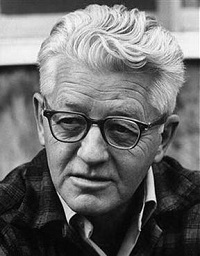The acknowledged dean of Western writers, Wallace Stegner influenced generations of authors and helped launch the modern environmental movement. He also demonstrated, in the words of one colleague, what it means to be a responsible, loving, thoughtful constituent of the human race.
Born in Iowa, Stegner grew up in Montana, Utah, and Saskatchewan, Canada. He became an Eagle Scout in Utah and explored natural wonders such as the Grand Canyon and what is now Zion National Park as a Scout.
Stegner taught at the University of Wisconsin and Harvard University before moving to Stanford University. There, he established a creative writing program in which students included Edward Abbey, Ernest Gaines, and Larry McMurtry. He also served on the board of the Sierra Club and was a special assistant to Secretary of the Interior Stewart Udall during the 1960s.
Stegner earned many awards for his writing, including the Pulitzer Prize for Fiction in 1972 (for Angle of
Repose) and the National Book Award in 1977 (for The Spectator Bird). However, his nonfiction work may
have had a greater impact on society. Most notably, his “Wilderness Letter” was used in the successful drive to create the National Wildlife Preservation System in 1964.

